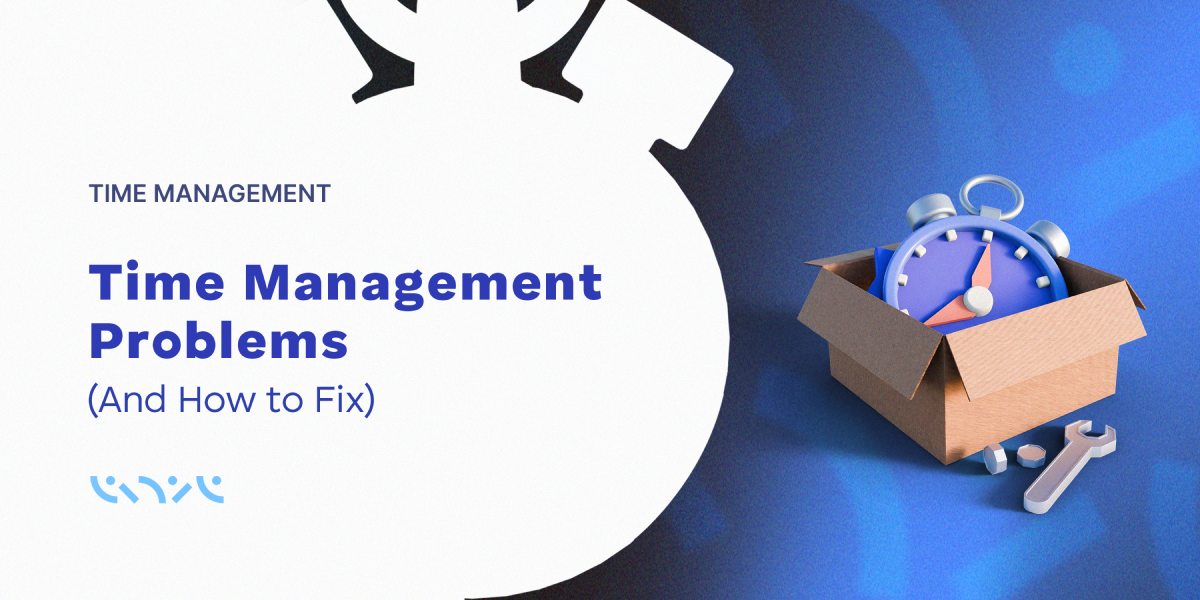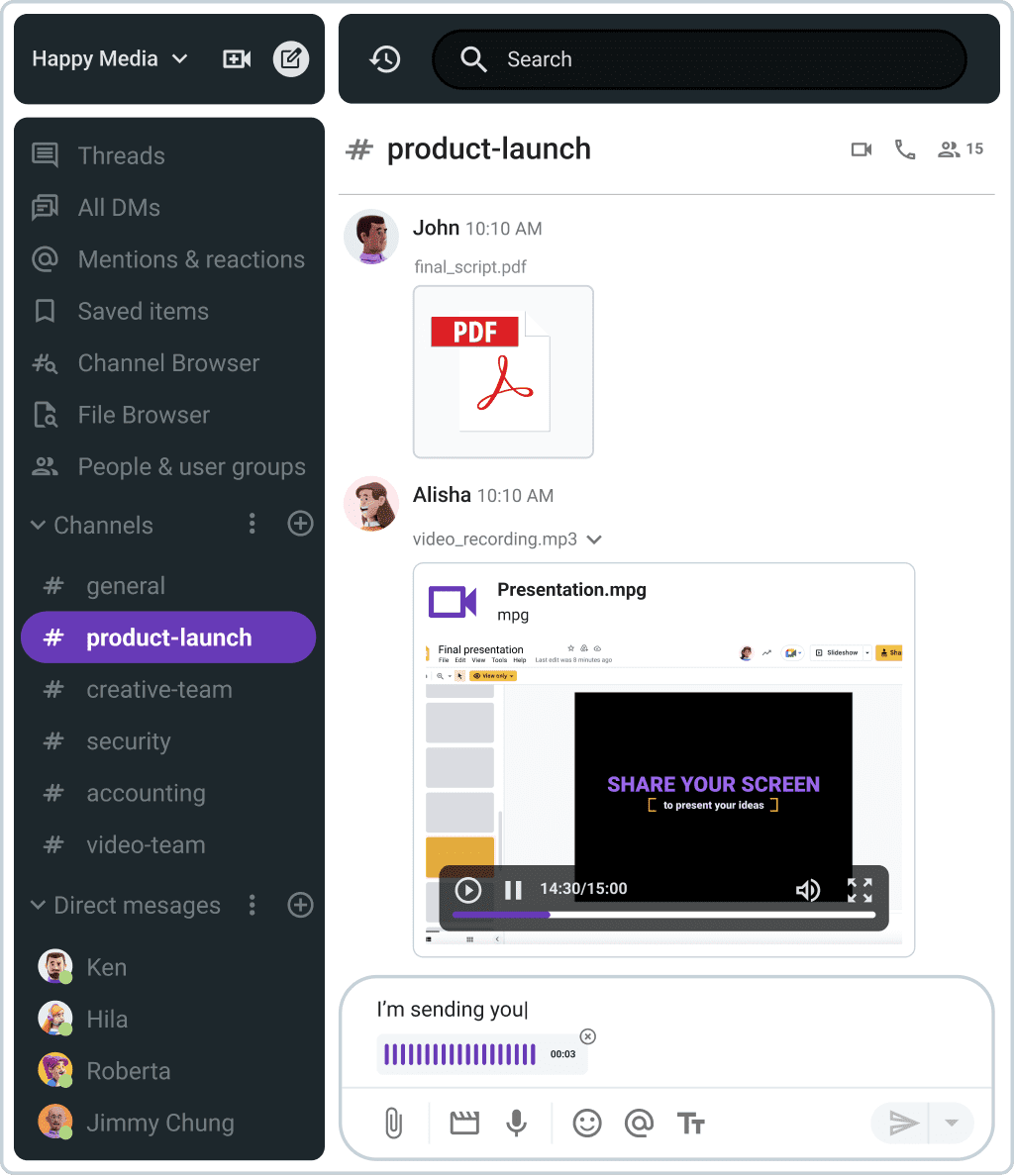How good are your time management skills?
No matter where you are on the scale — whether you’re struggling with it or you’re close to mastering it (or you’re anywhere in between) — there’s always room for improvement.
In this article, we’ll go over:
- The signs of poor time management (so you’ll be able to recognize them in yourself and others),
- What challenges poor time management can cause (so we can recognize the importance of good time management), and
- Common time management mistakes and how to solve them (because we all make them sometimes).

Table of Contents
Signs of poor time management
If you fail at completing your tasks repeatedly or can’t seem to finish anything on time (or you can’t stop multitasking) — perhaps it’s difficult for you to distribute your time accordingly. Poor time distribution may cause a series of challenges that we’ll discuss later in the article (as well as offer solutions, of course).
But for now, here are the most common signs of poor time management.
Easily distracted
It’s difficult to find a space that is completely free from distractions, but we can do our best to optimize our working space to be as distraction-free as possible.
The first step is to find out what distracts you the most:
- Are those notifications on your phone?
- Talking to your coworkers?
- Street noises?
After you figure out what it is, it will be easier to manage distractions and avoid them.
💡 Clockify Pro Tip
Learn about the most common workplace productivity killers and how to beat them:
Poor punctuality
We all know how it feels to be stuck in traffic and rush through the morning because our alarm didn’t go off. We’re human, and accidents happen. But, being constantly late is more than a slight accident — it’s disrespectful to others and their time.
As Anna Musson, the etiquette expert, told The Huffington Post Australia,
“There are a multitude of reasons as to why [someone is late], but the overriding reason is, it suggests deep down you think your time is more valuable than others.”
A few minutes of waiting here and there tends to add up quickly, resulting in a lot of wasted time.
Missing deadlines
Just as being late, if missing deadlines happens rarely and for a good reason, it can be filed under “things happen”. On the other hand, frequently missing deadlines could seriously impair your professional reputation as an employee.
To avoid this, it’s important to be able to rely on the people you work with and trust them to do their part so you can do yours. If people can’t rely on you, they won’t want to work with you.
If you happen to miss deadlines often — you should try to figure out why. Some of the most common reasons include:
- Procrastination,
- Multitasking,
- Inability to manage your time effectively,
- Not knowing how to delegate or outsource, and more.
💡 Clockify Pro Tip
Everything you need to know about procrastination — what it is, reasons why it happens, how to beat it, and more in this article:
Always rushing
Do you feel like you’re constantly in a rush? Does it seem too difficult to do everything you’ve planned?
This could be either because you’re waiting until the last minute, or because you have too many things on your plate, so you’re struggling to complete all the tasks.
At the same time, you could be going through an ongoing uneasiness because you feel like you’re constantly wasting your time. If this is the case, you might be dealing with time anxiety.
Whichever it is, it’s stressful, and it can certainly negatively affect the quality of your work.
Burnout
Perhaps the worst sign of poor time management is your health being at risk. One of the unfortunate consequences of poor time management is burnout. Burnout is a state of both physical and mental exhaustion. It’s most commonly recognized as employee burnout as it happens due to prolonged work-related stress and overworking.
According to one study, burnout shows itself in a variety of symptoms:
- Physical (shortness of breath, dizziness, weakened immune system),
- Emotional (mental exhaustion, feeling anxious, lack of empathy), and
- Behavioral (loss of motivation, poor performance at work, irritability).
💡 Clockify Pro Tip:
Find out more about burnout and how to cope with it:
What problems can poor time management cause?
Now that you’ve recognized some signs of poor time management, we want to draw your attention to the challenges that may occur due to inability to distribute your time effectively.
Problem #1: Stress
Poor time management causes us to rush, which results in a lot of additional stress. Sometimes, you’re already aware that you need to do something, but you avoid starting it. Other times, you might know deadlines are approaching, but you’re not even close to being done, so you have to squeeze two weeks’ worth of work into a day or two. Whichever the cause of your rush, it can be avoided by organizing your time better.
Problem #2: Low productivity and performance
When you’re leaving everything for the last minute, it’s very likely that your work will be of poor quality, as you’ll rush to get everything done. Racing against the clock will most likely negatively affect your employee performance and results.
Enhance productivity with Clockify
Problem #3: Having too much on your plate
You are in danger of overextending yourself if you don’t have a clear idea of:
- The time you need to complete your tasks, and
- The time you have available.
To avoid this, only accept projects that you’re completely sure you’ll be able to complete successfully.
Problem #4: Poor work-life balance
When you don’t have a set schedule, you’re probably always working, but rarely engaging in deep work. This results in a poor work-life balance, which can affect your mental health.
💡 Clockify Pro Tip:
Not juggling life and work properly may lead to even more detrimental consequences to your health. Read about mental exhaustion here:
How to solve the most common time management mistakes
Since the concept of time management consists of so many different aspects, most of us have difficulties with at least one of them.
Here are some of the most common time management mistakes we tend to make and tips on how to solve them:
- Not having a plan,
- Being bad at estimating time,
- Being overwhelmed,
- Letting distractions interfere with work,
- Procrastinating,
- Thinking busy and productive are the same, and
- Not taking breaks and time off work.
Time management mistake #1: Not having a plan
Do you want to be productive, but you feel a little lost? Are you unmotivated? Do you often have a feeling that you have forgotten something?
If you answered yes more than once — you’re probably aware that this usually happens when you don’t have a plan and you are just going with the flow and being reactive.
Tips on what to do when you don’t have a plan
Start by being proactive and making long-term and short-term goals. Sit down and think about things you want to get done and goals you want to achieve.
However, in order to set goals correctly, make sure they are SMART:
- Specific,
- Measurable,
- Attainable,
- Relevant, and
- Time-bound.
For example, “become rich” is not a SMART goal. Rich means something different to everyone. Trying to achieve the goal of “becoming rich” means running aimlessly with no finish line in sight.
Try something like this instead:
“Have X amount of money in my bank account by the end of the year.”
or
“Start earning (X amount) monthly by (a certain date).”
When your goal is, like the previous example, measurable, it will be easier to make a plan on how to get there, too.
💡 Clockify Pro Tip:
Learn more about setting SMART goals here:
Time management mistake #2: Being bad at estimating time
This used to be one of the biggest challenges I faced with. I had no idea how much time I needed to get ready or how much exactly it would take me to get from point A to point B. My assumptions were often a little off, which sometimes resulted in being late.
Tips on what to do when you are bad at estimating time
When I realized I tend to underestimate the amount of time I need to get something done, I started to measure it.
If you’re troubled by the same issues, you can simply use a stopwatch. Or, if you want to keep track of your time in a more organized way, try going with a time tracking app.
Tracking your time will help you estimate the time much more accurately, as you’ll have a lot of data to rely on and make an educated guess. This habit will also facilitate planning, as you’ll have a clear overview of where your time goes and what you should be doing more or less.
💡 Clockify Pro Tip:
Here are some time management techniques and games that you may find useful to break bad time management habits:
Time management mistake #3: Being overwhelmed
First of all — take a deep breath.
You can’t do everything. It’s completely fine. No one can.
Having a busy schedule can take a toll on you, so you should be gentle with yourself and accept that you’re not superhuman. Also, good news — there’s a solution for this.
Tips on what to do when you are being overwhelmed
It’s important to learn to prioritize.
Not prioritizing is a sure way to get overwhelmed or waste time doing random tasks at the expense of more important and/or urgent ones.
The Eisenhower matrix is a great method that will help you divide important from unimportant things.
All you need is a piece of paper that you’ll divide into four parts:
1) Important and urgent tasks — do them first.
2) Important but not urgent — schedule to do them later.
3) Urgent but not important a.k.a. it’s not you who must do them — delegate them.
4) Tasks that are neither urgent nor important — can be deleted from the list.
Also, make sure you leave a buffer between the things you scheduled to make sure you’ll finish a task before the next one starts and your schedule won’t get messed up.
💡 Clockify Pro Tip:
Read the following article to learn how to say “No” and set your priorities more wisely:
Time management mistake #4: Letting distractions interfere with work
Do you know what distracts you the most?
If you don’t, take this short assessment published by Harvard Business Review to find out which of the six most common types of distractions interfere with your productivity and ability to focus.
Tips on what to do when you are dealing with distractions
If you finished the first step of figuring out what your worst distractions are — it’s time to deal with them.
Here are some suggestions to reduce distractions and increase your focus:
- Work in a productive environment such as a library or shared workspace.
- Break tasks into chunks so they seem more doable and less intimidating.
- Turn off the notifications or put your phone in ‘do not disturb’ mode.
- Have a set time for checking emails (don’t read and respond to them throughout the whole day, as they break your concentration).
- If you work in a noisy environment, invest in good noise-canceling headphones.
Time management mistake #5: Procrastinating
What causes procrastination? It’s not “just being lazy”, often there’s a bigger reason — usually perfectionism and/or being afraid of failure.
Tips on what to do when you are procrastinating
There are several ways to approach procrastination, depending on the cause of it.
Here are our suggestions to beat procrastination:
- Accept that done is better than perfect
It’s probably easier said than done. However, nothing we ever do will be perfect, so it’s better to accept it sooner rather than later. That doesn’t mean we should stop putting effort into our work. It means we should stop endlessly fixing it, stressing over every detail, or not even beginning because we’re scared it won’t turn out exactly as we imagined.
- Break down big projects into small steps
Sometimes we procrastinate because we’re overwhelmed, and we put off starting because it seems like too much work.
But, when you break down your projects into smaller tasks, they seem much more doable. Just try focusing on one task at a time, and it won’t be nearly as scary.
- Ask for feedback
Do you procrastinate because you’re not sure if you’re able to complete the project successfully, or if you’re skilled enough for it?
Ask your manager or a trusted person from your team for feedback every now and then to make sure you’re going in the right direction. Be open to advice and criticism and use them as learning opportunities.
Time management mistake #6: Thinking busy and productive are the same
Do you equal being busy with being productive? Spending a lot of time working with getting a lot of things done? Do you think there’s no difference between working hard and working smart?
Contrary to popular belief, being busy and being productive are actually not the same. Thus, you can work the whole day only to realize that you haven’t accomplished anything significant.
Tips on what to do when you are confusing being busy with being productive
Here are some applicable tips that may help you distinguish between being busy and productive once and for all:
- Keep your goals in mind
When you’re writing your to-do list, ask yourself: Will this task bring me closer to my goals? Is this important to me? Can I delegate this task? This way, you’ll have a clearer idea of what your goals are.
- Again — prioritize your work
If you have some minor tasks to do, do them towards the end of your workday. Don’t waste your brain’s prime time on them — use it wisely, for more important tasks. This will keep you from multitasking, too.
- Group tasks together
It’s wise to group tasks according to their complexity, type, or priority. This way, you don’t lose a lot of focus when you’re switching from task to task.
Time management mistake #7: Not taking breaks and time off work
Working all the time actually won’t make you more productive — it will only lead you to burnout.
Your mind needs to be well-rested and fresh so it can focus and be efficient. You do your job better when you’re not exhausted and sleep-deprived, believe it or not.
Tips on what to do when you are not taking breaks and time off work
The solution to this one is pretty obvious — take breaks and use your vacation days.
Prevent yourself from working outside your working hours and thinking about work when you’re not actually working. There’s more to life than productivity and making money.
Use digital tools to fix common time management problems
Most of your work-related problems are fixable. Although you might feel that they are unique to you, we have to break it to you — they are not.
So what do you do?
To deal with overwhelming workloads, clunky communication, and time wasted on non-essential tasks, you can try out the CAKE.com productivity bundle that includes 3 powerful tools:
- Clockify — a time tracking app,
- Pumble — a team collaboration app, and
- Plaky — a task and project management app.
To start off, you can use Clockify to resist wasting time on non-essential tasks. To identify and minimize time spent on unproductive activities, you can use the Dashboard.

With the Clockify Dashboard, you receive information on projects, employees, clients, and tasks that you spend most time on. This data gives you the power to decide whether you’re spending mental energy on things that you’d rather not focus on. As a result, you can free up time and attention for other mission-critical tasks.
Secondly, you can sync your team and eliminate the clunky exchange of information by using Pumble. With this business team chat app, you get to easily enjoy productive collaboration via:
- Voice messages,
- Video messages,
- File sharing, and more.

With these handy features, you can get your whole team up to speed in a jiffy, increasing transparency and efficiency.
Last but not least, Plaky dispels all your project management worries. With the Plaky task and project management app, you can:
- Create boards,
- Set assignments,
- Track progress on tasks and much more.

This way, you’ll know exactly what everyone’s up to and when.



